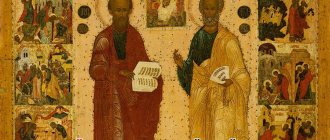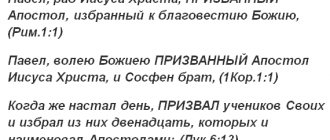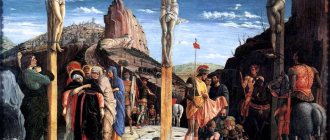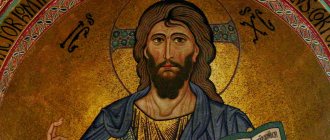When discussing the action of the Apostle Peter, who denied Christ three times and then repented, it is important to remember that God allows every person to change his decisions. Always humbly awaits what the final choice will be when the time comes to make it. For many who surrounded Jesus during his years on earth, this time came shortly before his crucifixion. At that moment, everyone faced a difficult dilemma: whether he was ready to stay with the Savior or go over to the side of his opponents.
Easter meal
Photo: Orthodoxchurch.ru
Everyone remembers well the words of Jesus spoken before the end of the Passover meal in the Garden of Gethsemane. With sadness, Christ said that one of his disciples, who was now sitting at the same table with him, would betray him. The apostles were embarrassed, since they all felt that they sincerely loved their Teacher. At the same time, each of them feared that they might not be able to restrain themselves, having committed something irreparable.
One after another, the disciples began to ask the Savior if they would be this traitor. Only Peter, who was convinced of his faith, did not ask anything, declaring that he would never be tempted. In response, Christ said that this was not so, and he would renounce him three times that same night.
Let us first remember directly what the betrayal consisted of
On the fourth day after the triumphal entry into Jerusalem, Jesus Christ said to the apostles: “You know that in two days the Passover will be, and the Son of Man will be handed over to be crucified” (Matthew 26:2). Just at this time, the leaders of the Jewish people - the scribes and elders - gathered with the high priest Caiaphas to figure out how they could destroy Jesus. Judas came to them, already planning to betray the Teacher, and said: “What will you give me, and I will betray Him to you? They offered him thirty pieces of silver” (Matthew 26:15). A few days passed, and a convenient opportunity presented itself to fulfill the plan - as the high priests wanted, in silence, “so that there would be no disturbance among the people” (Mark 14:2). After the Last Supper, the Savior and the apostles went to the Garden of Gethsemane. It was here that Judas brought an armed detachment. The traitor promised to give the soldiers a conventional sign: “Whomever I kiss is He, take Him. And immediately approaching Jesus, he said: Rejoice, Rabbi! And kissed Him. Jesus said to him, “Friend, why have you come?” Then they came and laid their hands on Jesus and took Him” (Matthew 26:48-50).
Another evangelist, Luke, described this moment even more dramatically. “Are you betraying the Son of Man with a kiss?” asks the Savior as Judas approached Him (Luke 22:48). Christ knows perfectly well what is happening, and Judas fails to deceive anyone.
Teacher's arrest
Photo: Elitsy.ru
Next came prayer and the subsequent arrest of Jesus following the denunciation of Judas. When Christ was sent to the high priest Annas, only two of the apostles followed him. These were Peter and John.
John made his way into the house, and Peter remained outside, going to the fire. Suddenly the maid recognized him, saying: “This is one of his students.” Then Peter denied for the first time. Then another woman also exclaimed that he was one of the followers of the arrested prophet. Again Peter stated that he did not even know this man.
Several more people began to claim that Peter was a disciple of Jesus, noting his Galilean accent. For the third time, Peter denied. Only at that moment did I understand the full depth of my mistake, the sin I had committed. I remembered the words of Christ that he would deny three times before the rooster crows, and immediately heard the rooster crow. Dawn began, only a few hours remained before the execution of the Savior.
Peter did not know what to do, repenting of what he had done. He was a leader among the disciples of Christ. He was already an adult who spent most of his life doing physical labor, never before thinking about moral values. He always believed that he was doing the right thing, and he would continue to do so. However, even his devotion and love for the Savior were vulnerable.
Conversation 34. The Apostle Peter’s threefold denial of Christ; his repentance
Today we continue our conversations on the Gospel of Matthew on Radio Radonezh. During today's conversation, we will finish our study of chapter 26 and begin our study of chapter 27. So we will cover two topics:
1) The Apostle Peter's threefold denial of Christ and his repentance
(26, 69–75);
2) Judas's repentance and suicide
(27, 1–10).
Cruelty increased, and the enraged Jews, sensing the smell of blood, could destroy not only Jesus, but also His closest disciples. Later, the Talmud will record a rule-injunction not only against adult Christians, but also their children. This is a statement that breathes malice: “The meat that is in the hand of the servant of the stars (that is, the idolater. - O.S.
), permitted for use (by the Jews -
O.S.
);
in the hand of a mina (that is, a Christian - O.S.
) - prohibited for use.
[…] Slaughter mine – for sacrifices to the stars. And their bread is the bread of the servants of the stars. Their wine is the wine of libation. Their fruits are not paid for in tithes. Their books (that is, Christian books - O.S.
) are books of witchcraft. Their children are illegitimate. They sell to them, but do not buy from them. And they do not take from them, and do not give to them. They do not teach children their skills and do not receive treatment from them”541. – That is, the first Christians who believed from the Jews were subjected to severe moral and social pressure, it was even forbidden to teach their children a craft and to receive treatment from them. Later in the church canons this hostility would be turned against the Jews themselves in strikingly similar terms.
But in reality, it was the Apostle Peter who would be the first to face the moral rejection of Christ and His disciples, and, fearing for their lives, Peter and the other disciples would remain in a kind of stupor “out of fear from the Jews” (John 20:19).
We read the 69th and 70th verses of the 26th chapter of the Gospel of Matthew:
Matthew 26:69–70. “Peter was sitting outside in the courtyard. And a certain maid came to him and said, “You too were with Jesus the Galilean.” But he denied it before everyone, saying, “I don’t know what you are saying.”
Here we see that the renunciation of Christ did not happen spontaneously, Peter was already - “out of fear from the Jews” - “ sitting outside in the courtyard
"
Blessed Jerome writes: “He sat outside to see the outcome of the matter.
And he did not approach Jesus, lest suspicion should somehow arise among the servants .”542
Meeting with the maid was not part of his plans, because he was sitting at a distance, but she herself “ came up to him... and said: you too were with Jesus the Galilean
", and fear took possession of his heart, fear for his own life - and he renounces the Lord Jesus Christ with the words: “
I don’t know what you are saying
.”
It turns out that even such an evasive answer, although formally it does not seem to be a renunciation, means precisely a renunciation of Christ - as a refusal to openly and in spite of everything confess Jesus as Lord. It is said: “If you confess with your mouth that Jesus is Lord and believe in your heart that God raised Him from the dead, you will be saved” (Rom. 10:9). Actually, confessor – in ancient Greek “martiros”
– means martyr; therefore, Peter, not ready for torment, is not ready for confession.
So what did he, the Apostle Peter, mean when he said, turning to his Divine Teacher: “even though I had to die with You, I will not deny You” (Matthew 26:35). Perhaps he imagined this feat as something very, very solemn, but not so everyday - some maid asks, perhaps with a dirty bucket in her hands...
As a matter of fact, neither Jews nor pagans ever demanded that the first Christians renounce Christ; they always demanded the performance of their special rituals or the utterance of special words. But this is precisely what Christians saw as a renunciation of Christ. Formality is akin to adherence to principles, and to say that formally there was no renunciation means that the renunciation was camouflaged, wore a hidden form, or was hidden from oneself and from God.
Euthymius Zigaben writes: “See how the one who recently boasted so much before this was now afraid of the weak servant, when he was abandoned by God’s grace.”
543. But why is he, Peter, a communicant of the first Eucharist - and has already been left behind by grace?
The problem of the apostle is that he trusts too much in himself and thinks that Christ needs his steadfastness and firmness, his help. But it is we who need God’s protection, and nothing else, and not the other way around. It is said: “Guide me to Your truth and teach me, for You are the God of my salvation; I trust in You all day long” (Ps. 24:5); and again: “And all those who trust in You will rejoice, they will rejoice forever, and You will protect them; and those who love Your name will boast in You” (Ps. 5:12). – That is, our hope
and
hope
is in the Lord;
to rejoice
and
boast
in His name.
And then we read:
Matthew 26:71–72. “When he went out of the gate, another saw him, and said to those who were there, “This one too was with Jesus of Nazareth.” And he again denied with an oath that he did not know this Man.”
Here we see how renunciation, which at first was of a hidden nature, took on a seemingly neutral appearance - they say, “ I don’t know what you’re saying.”
”, - now takes on clearer outlines, leaving no doubt that the Apostle Peter, this “stone of faith,” allowed cowardice, betrayal, and therefore unbelief. It is said: “Thus says the Lord: For three transgressions of the children of Ammon and for four I will not spare them” (Amos 1:13). – That is, one renunciation can be perceived as spontaneous and ill-considered, as a crime committed in a state of passion. If it is immediately repeated in an even more open form, then perhaps the inertia of the first mistake is at work here too. But if this happens a third time, then, as the prophet Amos says: “I will not spare them for three crimes of the sons of Ammon and for four.” That is, the disease of sin, with a series of repetitions, seems to become chronic and now needs more radical forms of healing.
Saint John Chrysostom reasons: “A strange and unexpected thing! When Peter saw how they detained the Teacher, he became so inflamed that he grabbed a sword and cut off his ear; and when it was necessary to show more indignation, to become more inflamed, hearing such insults, then he renounces! Who, really, wouldn't be enraged by what happened then? And yet, the disciple, overcome by fear, not only does not show any indignation, but also renounces and does not tolerate the threat of the poor, powerless servant. And not once, but also another and a third time, he renounces, and in a short time, and not before the judges, since he was in the courtyard, and the maid asked him when he went out of the gate. He did not immediately feel his fall.
»544.
Fear seemed to fetter the consciousness of the apostle, his reason and memory (he forgot the vow given to the Lord and his apostolic dignity). But doesn’t something similar happen to us when we fall into a state of one sin or another, realizing that we are doing it in the presence of the Lord? What happens then to our conscience and faith? What kind of atheistic (godless) stupor do we fall into, and where does the shame of committing abominations go in the eyes of the omnipresent and all-seeing Lord? It is said: “Shall I say: “Perhaps the darkness will hide me, and the light around me will become night”; but the darkness will not obscure You, and the night is as bright as the day: as is the darkness, so is the light” (Ps. 139:11-12).
Blessed Jerome of Stridon, paying attention to the words “ does not know this Man”
“, writes:
“I know that some pious, under the influence of love for the Apostle Peter, explain this passage in such a way that it is as if the apostle denied not God, but man, and that the meaning [of his words] is this: “I do not know man, because that I know [Him as] God.”
The prudent reader understands how frivolous this interpretation is: they defend the apostle in such a way that they present God as guilty of lying. Indeed, if the apostle did not deny, then the Lord uttered a lie when he said: “Truly I tell you, this night, before the rooster crows, you will deny Me three times.” Pay attention: He says: “you will deny Me,” and not: “from man. ”545.
- On the other hand, if we accept an interpretation with which Jerome does not agree, then we will lose the value of the lesson that we can learn from the repentance of the Apostle Peter
, which is so different from
the repentance of Judas
.
And then we read:
Matthew 26:73–74. “A little later those standing there came and said to Peter, “Surely you are one of them, for your speech also convicts you.” Then he began to swear and swear that he did not know This Man.”
And then we read:
Matthew 26:74. “And suddenly the rooster crowed.”
Saint John Chrysostom writes: “Luke says that Jesus looked at him (Luke 22:61), that is, he not only denied, but even then, when the rooster crowed, he did not remember on his own, but it was necessary for him to be reminded again the Teacher: his gaze served him instead of his voice. So he was struck with fear! Mark tells us that the rooster crowed when Peter denied for the first time; then he sang a second time when he denied for the third time (Mark 14:68-72), - that is, more precisely, he recounts the weakness of the disciple and his numbness from horror; and Mark learned about this from his teacher, since he was Peter’s companion. Therefore, one should be surprised at him all the more that he not only did not hide the fall of his teacher, but on the contrary. That is why he spoke about it more clearly than others, that he was a student
"546.
- This was the apostolic style - not to hide anything about yourself. Sometimes the sin or serious mistake of spiritually great people provided them with even greater spiritual growth and always created a contrast between fall
and
rebellion
. It is said: “For this son of mine was dead and is alive, he was lost and is found. And they began to have fun” (Luke 15:24).
And then we read:
Matthew 26:75. “And Peter remembered the word that Jesus had spoken to him: Before the rooster crows, you will deny Me three times. And going out, he wept bitterly.”
Saint John Chrysostom notes: “Before the rooster could finish the first reception, Peter denied three times. And when Christ brought sin to his memory
(“Then the Lord turned and looked at Peter, and Peter remembered the word of the Lord” - Luke 22:61)
, he did not dare to cry openly, so as not to be accused of tears, but “going out, he wept bitterly”
”547. Please note that he even hides his tears of repentance from strangers, but his own people - the entire Christian world - know and remember them. The repentance of the Apostle Peter was not a self-repentance pushing towards suicidality, like a kind of self-criticism that plunges the soul into even greater despondency and despair. It is said: “If we confess our sins, He, being faithful and righteous, will forgive us our sins and cleanse us from all unrighteousness” (1 John 1:9); and again: “For I will be merciful to their iniquities, and their sins and their iniquities will I remember no more” (Heb. 8:12).
Blessed Jerome writes: “In another Gospel we read that after Peter’s denial and the rooster’s crow, the Savior looked at Peter and with His gaze brought him to bitter tears. And it could not be that a person who contemplated the light of the world should remain in the darkness of renunciation. - “And going out, he wept bitterly.” Sitting at the entrance to Caiaphas's house, he could not repent; he left the council of the wicked in order to wash away the impurity of timid renunciation with bitter tears
»548.
Judas's repentance and suicide
We move on to the next chapter and the next topic: Judas's repentance and suicide
.
But first, let's look at what we know about Judas. He received his nickname from the town of Keriof, from which he was from (Heb. Ish
-
Keriof
- a man from Keriof).
He was also the only native of Judea, a Jew
among the apostles, who were all
Galileans
. There was an ancient saying, which was fully fulfilled by the Apostle Jude: “The Galilean loves fame, but the Jew loves money.”
Here we will consider the question: was Judas destined from the very beginning to become what he became? And is there some kind of predestination for each of us?
We have touched on this issue before.
Saint John of Damascus said: “We must firmly remember that God foresees everything, but does not predetermine everything; for He foresees everything in us, but [by no means] predetermines everything [in us].”
549. For, as it may seem, our righteous and sinful actions are entirely ours, otherwise reward for good and punishment for evil would be meaningless. But does this mean that we are absolutely free in our intentions and actions?
Damascene calls predestination the inevitability by which we all, to one degree or another, participate in the economy of God’s salvation; he writes: “He does not desire evil, but does not force us to virtue.”
550 - but this does not mean that we are absolutely free in our intentions and actions.
It is said about virtues
: “Every good gift and every perfect gift is from above, coming down from the Father of lights” (James 1:17).
It is also said about evil
: “I form light and create darkness, I make peace and create disasters; I, the Lord, do all these things” (Isaiah 45:7). – That is, both good and evil are under the complete control of God.
But the Holy Fathers show us that the very presence of a body in human nature, through its changeability, provides for man the possibility of relative choice. What the Holy Fathers deny to Angels as incorporeal creatures.
However, it seems that the fallen angels (demons) lost the opportunity for change, having lost power over matter, over the Earth, and man succeeded them, becoming the earthly ruler (see Gen. 1:28). And the Angels faithful to God, having not followed the devil, having finally decided on good, can no longer change.
Actually, immutability as a property of God (see James 1:17) is the ultimate goal of all thinking beings and is realized when the thinking creation is finally determined to be good or evil. It is said: “And besides all this, a great gulf has been established between us and you, so that those who want to cross from here to you cannot cross, nor can they cross from there to us” (Luke 16:26). And when the saved nations “come from the east and the west and lie down with Abraham, Isaac and Jacob in the kingdom of heaven” (Matthew 8:11), a blessed immutability will arise for them. Likewise, sinners, once in hell, will acquire a painful immutability. It is said: “And these will go away into everlasting punishment, but the righteous into everlasting life” (Matthew 25:46).
The Apostle says: “...we have not received the spirit of this world, but the Spirit who is from God, that we might know the things freely given to us by God” (1 Cor. 2:12). – That is, the Holy Spirit is the guarantee of eternal salvation, and those who receive Him are already destined for eternal bliss. But it is directly said about Judas that although “he was numbered... and received the lot of this ministry; but he acquired the land with unjust wages, and when he fell, his belly was split open, and all his entrails fell out” (Acts 1:17-18). In other words, although Judas was numbered
to the number of those saved and exalted in the apostolic ministry, he himself fell from this glorious lot.
This may seem to be contradicted by the following words: “...those whom He predestined, He also called” (Rom. 8:30). And the question naturally arises: if the Lord, having predestined him, called and chose him, then for what? Of course, for eternal glory and eternal bliss!
And if he lacked his own strength, then, as the Holy Fathers teach: if it does not seem possible for a person to achieve salvation in a natural way with his own strength (see Matt. 19:25-26), then the soul must be directed towards salvation, just as an arrow is directed archer to the target. From this we conclude that predestination
- is part of
Divine Providence
.
Blessed Augustine wrote that “predestination is the foreknowledge of the mercies of the Lord”
551.
So, God’s plan is “that all people should be saved and come to the knowledge of the truth” (1 Tim. 2:4). Therefore, we must “instruct our opponents with gentleness, lest God grant them repentance to the knowledge of the truth” (2 Tim. 2:25).
Thus, we establish that it was not Judas’s money-loving corruption that prevented him from reforming, and even betrayal itself did not prevent him from repenting, having found support in the mercy of God, but he relied on his selfishness and destroyed himself. As it is said: “You have destroyed yourself, O Israel, for only in Me is your support” (Hos. 13:9). And we see that the one rejected by God does not lose the opportunity to come out of this rejection and find support for this in God and with God, who said: “Do I want the death of the wicked? says the Lord God. Is it not that he should turn from his ways and live?” (Ezek.18:23).
Therefore, words such as: “Behold the working of God: for who can make straight what He has made crooked?” (Eccl. 7:13); and also: “He who is true, who has the key of David, who... locks, and no one will open” (Rev. 3:7) - cannot be understood in this earthly life as a final impossibility, but more as a hypothetical impossibility. For while a person is alive, there is hope for his correction and change. These words are literally fulfilled only when a person, having accomplished good or evil, has already moved on to another life.
And we read the 1st and 2nd verses of the 27th chapter of the Gospel of Matthew:
Matthew 27:1–2. “When the morning had come, all the chief priests and the elders of the people had a meeting concerning Jesus, to put Him to death; and having bound Him, they took Him away and handed Him over to Pontius Pilate, the governor.”
Here we see the literal fulfillment of the prophecy spoken about Christ (the Messiah) by the dying patriarch Jacob. It is said: “The scepter will not depart from Judah, nor the lawgiver from between his feet, until the Reconciler comes, and to Him is the submission of the nations” (Gen. 49:10). That is, Christ lived in His First Coming when royal and legislative power was taken away from the Jews. The king was Herod Agrippa, a descendant of Edom, and the Jews themselves lost the right to approve the death sentence, for this they went to Pontius Pilate. Christian historian William Barclay writes: “This was necessary because the Jews had the right to try ordinary charges, but could not carry out the death penalty; Only a Roman procurator could pronounce such a sentence, and it was carried out by the Roman authorities. And therefore the Sanhedrin had to formulate a charge with which they could go to Pontius Pilate and demand the death sentence of Jesus.”
552.
Blessed Jerome of Stridon writes: “He was not only brought to Pilate, but also to Herod, so that both would mock the Lord. And pay attention to the care of the priests when committing evil. They stayed awake all night to commit the murder, and “they handed him over to Pilate, bound,” for it was their custom to hand over to the judge the one who was sentenced to death.
"553. - What vigor and what zeal! They really hardly slept that night, and in the morning they were already rushing to the procurator Pontius Pilate. It seems that the devil himself gave strength and energy to these generally middle-aged people.
William Barclay reports about Pontius Pilate: “Pontius Pilate was officially the procurator of the province; and he was responsible directly to the emperor, and not to the Roman Senate. He had to be at least 27 years old, because only from this age could he receive the post of procurator. He must have been quite an experienced man, because he had to first go through and climb a whole ladder of positions, including commanding military positions, before being eligible to occupy the position of procurator. Pontius Pilate had to be a tried and tested warrior and administrator. He became procurator of Judea in 26 and held this post for ten years, after which he was recalled."
554.
And then we read:
Matthew 27:3–5. “Then Judas, who had betrayed Him, saw that He was condemned and, repenting, returned the thirty pieces of silver to the chief priests and elders, saying: I have sinned in betraying innocent blood. They said to him: What is that to us? take a look yourself. And, throwing away the pieces of silver in the temple, he went out, went and hanged himself.”
Saint John Chrysostom interpreted these verses this way: “Look, when does Judas repent? When a crime has already been committed and brought to an end. This is the devil: he does not allow the careless to look at their sin before they commit it, so that the one caught does not repent. The traitor did not move then, as Jesus denounced him so many times, but when the crime had already been committed, repentance came to his mind - it came, but to no avail. Of course, it is commendable that he confessed, threw down the pieces of silver and was not afraid of the Jews; but that he put a noose on himself is an unforgivable sin, this is the work of an evil demon. The devil distracted him from repentance so that it remained completely useless for him; he killed him with a shameful death and open to everyone, inspiring him to destroy himself
»555.
Here we see two types of repentance: the repentance of the Apostle Peter and the repentance of Judas. We read about Peter’s repentance: “ And Peter remembered the word that Jesus had spoken to him... And he went out and wept bitterly
"(Matthew 26:75).
It is said about the repentance of the traitor: “ ... having repented, he returned the thirty pieces of silver to the high priests and elders, saying: I have sinned by betraying innocent blood... And, throwing away the pieces of silver in the temple, he went out, went and hanged himself
” (Matthew 27: 3-5).
From the point of view of formal logic, Judas's repentance at first looks more convincing than Peter's. Judas realizes that he has sinned by “ betraying innocent blood
,” he even tries to correct something by “
throwing the pieces of silver in the temple
.”
But, despite a number of fairly meaningful actions and words, he draws the wrong conclusions from what happened. He did not “ weep bitterly
” like the Apostle Peter, but “
went and hanged himself
.”
A too formal attitude towards repentance is unacceptable. Magism differs from religion precisely in its formal, external and purely ritual attitude. And God needs our heart. It is said: “And you shall love the Lord your God with all your heart and with all your soul and with all your strength. And these words which I command you today shall be in your heart [and in your soul]” (Deut. 6:5-6). Judas's repentance was too rational and rational, his heart continued to be silent, and God did not accept his contrition, and he “ went and hanged himself
.”
Sometimes a believer waits for blessing where only his hands worked, and his heart was silent. About this state it is said: “God, who created the world and everything in it, He, being the Lord of heaven and earth, does not live in temples made by hands and does not require the service of human hands, as if He needed anything, Himself giving life to everything.” and breath and everything” (Acts 17:24-25).
So, we see that Judas’s repentance was selfish repentance towards himself. Saint John Chrysostom writes: “This increases his guilt too... not because he repented, but because he repented too late and pronounced condemnation on himself...”
556.
He was left alone with his sin, and sin, tearing him apart from the inside, pushed him to suicide, that is, an act after which nothing can be corrected or changed. As I often say, any sin is suicidal, it contains the seeds of personal self-destruction and puts a person on the edge of the grave, so that the breath of death and the cold of decay hits him in the face.
You should never be left alone with your own sin, any sin. And those people who hide their sins and do not resort to the saving Sacrament of Confession are at great risk.
There are people who, when going to confession, show false shame in front of the priest and hide their sins. Such people have a serious danger of getting stuck in the second ordeal. Such shame in confession is due to the fact that when a person begins to communicate closely with a priest, he thinks that the priest will change his attitude towards him for the worse if he finds out about all his sins. In fact, this is the thought whispered by the devil. Just the opposite: a priest, if he feels that the confession is not sincere, may grow cold towards this person. And when the priest sees that a person trusts him completely, he becomes imbued with compassion for the person.
The First Epistle of John the Theologian says: “If we confess our sins, then He, being faithful and righteous, will forgive us our sins and cleanse us from all unrighteousness. If we say that we have not sinned, we make Him a liar, and His word is not in us” (1 John 1:9-10). That is, if we don’t hide anything during confession, that’s one thing. If we say that we have not sinned, then “we appear to Him to be false, and His word is not in us.” If, having come to confession, we engage in narcissism in front of the priest, hide our sins or look for some kind of justification for them, there is a real danger that we will definitely get stuck in the second ordeal.
As a pastor who has been serving for quite a number of years, I can say that it is impossible to surprise a priest with anything at confession. I have been in the priesthood for more than twenty-five years and could be convinced that a priest cannot be surprised at confession. Everything you say is said by the same people who are standing next to you.
At one time, the holy righteous Father John of Kronstadt obtained a general confession from the Synod, because he had a lot of people who wanted to confess. And they did it this way: in St. Andrew’s Cathedral in Kronstadt the lights were turned off, only two lamps on the iconostasis were burning - in front of the icon of Jesus Christ and in front of the icon of the Mother of God. Saint John of Kronstadt spoke a sermon, and then confession began... One man who was at this confession describes how people around began to confess their sins out loud, shouting them out loud. Some woman started screaming that she had poisoned her child inside herself, a man was shouting that he had the sin of incest, someone else was shouting something. The first thought of the soul that finds itself in such conditions is: hell is all around me. But when a person looked into himself, he saw the same sins and also began to shout them out. He also started screaming. Therefore, know that false shame in confession can really prevent people from going through the second ordeal. Scripture says that “all unrighteousness is sin” (1 John 5:17).
And then we read:
Matthew 27:6–7. “The high priests, taking the pieces of silver, said: it is not permissible to put them in the church treasury, because this is the price of blood. Having held a meeting, they bought a potter’s land with them for the burial of strangers.”
Origen interpreted these verses as follows: “But since there are differences among the places (burials) of the dead (because many, by will and desire, are buried in their paternal tombs, although often due to some vicissitudes they are buried in other people’s tombs), therefore, taking “the price of the blood” of Jesus, they used it to purchase the land of a certain “potter”, so that the dead wanderers would be buried on it, not according to their will, but according to some chance, they had acquired something contrary to (their will). If it is appropriate to spiritually understand “strangers,” then we call “strangers” those who until the end remain external to God and alien to His covenants. So, the “wanderers” of this kind have an end that they are buried in the soil of the “potter”, which was bought at the price of “blood”. For they are righteous who say: “We are buried” (Rom. 6:4; Col. 2:12) with Christ “in a new tomb, which is hewn out of the rock” (Matthew 27:60), in a hewn tomb, where else none was laid from the dead. And those who to the end remain strangers for Christ and strangers to God will, without a doubt, accordingly say: “we are buried” with the strangers in the land of the “potter” processing the clay, which was “bought with the price of blood,” and we are on the land called "land of blood"
557. – These ahasphere wanderers are also Jews who, finding themselves scattered throughout the world, were buried not in their fathers’ tombs in the Holy Land, but wherever they had to.
The Jews of the Dispersion, the Jews in Galut, even came up with the belief that their bones, wherever they were buried, crawl underground into the land of Israel (Heb. Eretz Israel
).
And then we read:
Matthew 27:8. “Therefore that land is called the “land of blood” to this day.”
"Land of Blood"
" is a Jewish synagogue that still bears the curse of the blood of the Son of God, which is why ancient church rules prohibit Orthodox Christians from visiting synagogues.
It is said: “Blessed is the man who does not walk in the counsel of the wicked, and does not stand in the way of sinners, and does not sit in the seat of the wicked” (Ps. 1:1). – Here we are talking about three actions at once that are not possible in relation to any wicked: you cannot walk
with them, that is, travel;
you cannot stand
with them for the same cause;
and you cannot sit
with them, that is, invite them into your homes or, moreover, enter their homes.
And then we read:
Matthew 27:9–10. “Then was fulfilled what was spoken through the prophet Jeremiah, who said: And they took thirty pieces of silver, the price of Him who was valued, whom the children of Israel valued, and gave them for the potter’s land, as the Lord said to me.”
Blessed Jerome of Stridon writes: “We do not find this evidence in the prophet Jeremiah. And in Zechariah, who is almost the last of the prophets, we find some similarity to this. And although the meaning is somewhat different, the words and their arrangement are also different. I recently read in a certain Hebrew scroll, given to me by a Jew of the Nazarene sect, the secret work of Jeremiah, in which this passage is given word for word. However, it seems to me that this testimony was borrowed, rather, from the prophet Zechariah, because the evangelists and apostles usually cite only the meaning with a change in word order as an example from the Old Testament
"558. The testimony of Jerome, as a major specialist in the Bible, an expert in the Hebrew and Ancient Greek languages, can be trusted. This question—about the attribution of this quote to the prophet Jeremiah and its not being found in the canonical body of Jeremiah’s writings—has long troubled scholars of the Gospel of Matthew.
Here is how a similar text is quoted by the prophet Zechariah: “And I will say to them: if it pleases you, then give Me My wages; if not, don’t give it; and they will weigh out thirty pieces of silver as payment to Me. And the Lord said to me: throw them into the church storehouse - the high price at which they valued Me! And I took thirty pieces of silver and threw them into the house of the Lord for the potter” (Zechariah 11:12-13).
But the problem is much deeper. The apostles used many books and sources that have not reached us. For example, a famous saying from the Book of Enoch from the Epistle of the Apostle Jude (see Jude 1:14–15). In the apostolic writings we see a good knowledge of the sayings of the school of Beit Hillel and Beit Shammai. Christ Himself in His teachings paraphrased one of Hillel’s statements (see Matt. 7:12). The Apostle Paul quotes a statement of Christ that is not included in any of the four Gospels: “we must support the weak and remember the words of the Lord Jesus, for He Himself said: “It is more blessed to give than to receive”” (Acts 20:35). The apostles knew and actively used Jewish traditions (Hebrew masorah
) and midrashim (a way of reading the biblical text literally).
For example, the Apostle Paul in his Epistle to Timothy wrote: “As Jannes and Jambres resisted Moses, so these also resist the truth, men of depraved minds, ignorant of the faith” (2 Tim. 3:8). – But such characters in connection with Moses as Jannes and Jambres are not mentioned anywhere in the Pentateuch; this topic is taken entirely from the well-known midrashim on the Book of Exodus (Heb. Shemot
). The fact is that Tradition and Scripture - two types of transmission of Divine Revelation - existed in the Old Testament Church, just as they exist in the New Testament Church. And the ancient Church of Christ received from the Jews not only the Books of the Old Testament, but also part of the traditions, religious ideas and beliefs that were organically woven into the Christian understanding of the Holy Scriptures. The recently published facsimile edition of the 16th-century Facial Compendium is replete with illustrated commentaries in the midrashim tradition on the first eight Books of the Bible. The interpretations of the Holy Scriptures of the ancient fathers of the 2nd and 3rd centuries are replete with allusions to Jewish sources. Blessed Jerome of Stridon even introduces the theological concept of “Jewish truth” (Hebraica veritas).
Thus, it was the Christian Apostolic Church that turned out to be the true successor to the collapsed synagogue and legally continues the tradition of the patriarchs and prophets. So, the Church of God exists continuously from Adam to Seth, from Seth to Noah, from Noah through Shem to Abraham, from Abraham through Isaac to David, from David to Christ, and so it will be until the Second Coming. It is said: “If the Lord of hosts had not left us a small remnant, we would have been like Sodom, we would have become like Gomorrah” (Is. 1:9).
For until the curtain (katapetasma) in the Jerusalem Temple was torn in two, they still remained the Church of God. So in our time, there are those who stand on the brink: either they will remain with us, or the mutations of their beliefs will take them so far from the Orthodox way of thinking that we will have to part with them.
Just as the dilapidated synagogue collapsed, and the Church of God arose on its spiritual ruins, in the same way all heresies and neo-renovationist schisms will collapse, but the Orthodox Church will stand, “and the gates of hell will not prevail against it” (Matthew 16:18).
Christ save you!
Why did Peter deny Jesus Christ?
Photo: Pravmir.ru
It may seem that the renunciation was almost accidental, becoming a momentary weakness. Or Peter’s natural instinct of self-preservation kicked in. At the same time, it is undeniable that the renunciation took place; the leader among Jesus’ disciples, at least for a few minutes, admitted that at that moment it was worth giving up his connection with Christ, at least in the minds of those around him. This is a serious crime against the love that binds people together.
Peter almost immediately repented of what he had done. But repentance took time, since it presupposed changes in actions. Peter did not go to Golgotha, where only John is among the apostles. It is not known what he did on Saturday, when the body of the Savior rested in the tomb.
But it is well known that, as soon as he heard about the disappearance of the body, he was among the first to arrive at the burial place. This haste became one of the clearest signs of repentance. Peter did not allow himself to sit at home, immediately going to the place where until recently there had been guards who could well have arrested the followers of the executed prophet.
How did Judas come to the decision to betray?
Let us immediately note: his betrayal was planned and thought out in advance. This is clearly seen from the gospel narrative. Judas comes to the high priests in advance and offers them a deal. However, Christ several times makes it clear to the traitor that he knows about his intention; the last time is during the Last Supper, when He directly says: “Truly I say to you, one of you will betray Me” (Matthew 26:21). Moreover, Christ warns: “Woe to that man by whom the Son of Man is betrayed: it would have been better for this man not to have been born” (Matthew 26:24). These words - “it would be better not to be born” - were a common expression in Judea and meant a catastrophe in life (similar words are uttered in the biblical Book of Job by its main character, who suddenly lost everything - property, children, the respect of the people around him, and health ). But Judas is not embarrassed by this either; he has already decided everything. And when Christ told him: “Whatever you do, do it quickly” (John 13:27), - the last chance to repent! - Judas went and brought the guards...
Why such a persistent desire, where does it come from? After all, he was among Christ’s closest disciples, witnessed the Savior’s amazing sermons and miracles (and perhaps he himself performed them at the time when Jesus sent his disciples to preach). What happened? The Evangelist John cites one very prosaic fact that could perhaps shed light on the reason for the fall of Judas (which will still remain a mystery to the end). This fact is that Judas was a thief. At some point, he began to dabble in the funds of the apostolic community. He began to appropriate coins from the box in which people put money for Christ and His disciples and which they entrusted to him to carry (John 12:6). Judas was a lover of money. Please note that, having appeared to Caiaphas, he first of all asks the question: what (how much) will he receive for handing over the Teacher?
Using this passion - the love of money, Satan had been attacking Judas for a long time, writes Blessed Theophylact of Bulgaria. Passion alienated Judas from the Teacher and friends, giving rise to secrecy and distrust in him. As a result, he remained deaf to frank, direct calls to repent. He finally decided on his betrayal. The worst thing: this happened right during the Last Supper, when Judas took communion with Christ and the apostles! The Gospel says so: “after this piece [of bread, given by Christ to Judas. – Approx. ed.] Satan entered into him” (John 13:27). From then on, the actions of the traitor were no longer only his own, but also the actions of the enemy of the human race.
But then Judas repented?
Yes, so says the Apostle Matthew. Judas came to the temple with the words: “I have sinned by betraying innocent blood” (Matthew 27:4), and threw thirty pieces of silver onto the floor. Why, why? Conscience awoke in Judas, says St. John Chrysostom. After all, Judas was not a completely immoral person. He understood well that he had committed a sin, doomed the saint, the Righteous One to death... And when Christ was condemned, the consciousness of guilt began to gnaw at Judas. This is exactly how passion always works: first it blinds a person, and then, when there is no turning back, it begins to torment him with pangs of conscience.
Judas's trouble was that he was left alone with himself, and also with the harsh Jewish law, which said: an eye for an eye, a tooth for a tooth, whoever puts another to death is guilty of death. Even asking for forgiveness from Christ - if, again, such a thought flashed through Judas - it seemed to be no longer possible (as the former apostle probably could have thought).
For three years he followed Christ and, it seems, did not hear a single word of His instructions about love for the sinner, about repentance, about His own suffering, death and the coming resurrection from the dead. The comforting words passed by the ears of Judas: “him who comes to Me I will in no wise cast out” (John 6:37).
In his disappointment, Judas turned not to God, but to himself. As St. Justin (Popovich) writes, “repenting to oneself is not repentance, for a person cannot free himself from sin, forgive himself for sin, absolve himself of sin. Only God, the Son of God, has this authority and power.”
So, while still alive, he found himself in hell - with the consciousness of complete loneliness and the impossibility of changing anything. As a person who does not hope for God's mercy. Weighed down, suffocated by the consciousness of his guilt, as if in an airless space. Isn't it symbolic that he ended his life by suffocating in a noose?
What follows from all this?
The terrible words of Jesus Christ: “It would have been better for this man not to have been born” (Matthew 26:23), unfortunately, were fulfilled in Judas. They might not have been fulfilled, just as Jonah’s prophecy about the destruction of the city of Nineveh was not fulfilled. The inhabitants of Nineveh repented, that is, they not only realized that they had violated God’s commandments, but also actually changed their lives, and the Lord joyfully canceled the harsh determination about their fate. And Judas repented, but could not repent. He lacked love and faith. Love for Christ and faith in Christ as God.
It was a completely different matter for Peter, who loved Jesus sincerely, believed Him without looking back and always wanted one thing - to be with Him until death. Having become faint-hearted, but sincerely repenting before the Lord, Peter was determined to change. From now on, he never renounced Christ, even knowing that martyrdom on the cross awaited him. Peter became a preacher and missionary: he taught the word of God in Greece, Rome, Spain, Asia Minor, Egypt, Carthage, baptized thousands of people, healed the sick, and revived the dead. And Peter’s strong faith became, as Jesus Christ promised, the rock underlying the Church: “And I say to you, you are Peter, and on this rock I will build My Church, and the gates of hell will not prevail against it” (Matthew 16:18 ).
Igor Tsukanov
Angelina Dadasheva








